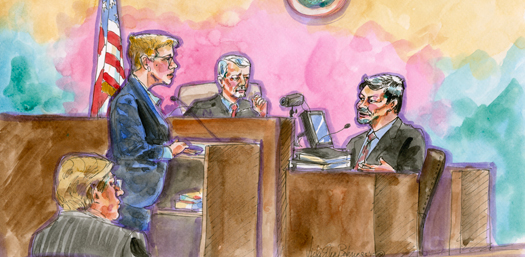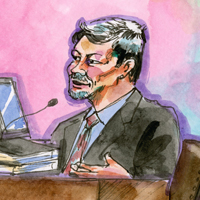Marriage News Blog

 On the second and third days of trial, Yale history professor George Chauncey testified about the history of discrimination faced by gay and lesbian Americans.┬Ā In particular, Professor Chauncey explained how the Proposition 8 campaign reflected that discrimination and relied on anti-gay stereotypes.
On the second and third days of trial, Yale history professor George Chauncey testified about the history of discrimination faced by gay and lesbian Americans.┬Ā In particular, Professor Chauncey explained how the Proposition 8 campaign reflected that discrimination and relied on anti-gay stereotypes.
Professor Chauncey is the author of several books on gay and lesbian history, including Gay New York: Gender, Urban Culture, and the Making of the Gay Male World, 1890-1940 and Why Marriage: The History Shaping TodayŌĆÖs Debate Over Gay Equality.
Testimony Highlights
ŌĆ£[M]y reading of the historical record is that lesbians and gay men have experienced widespread and acute discrimination from both public and private authorities over the course of the 20th century. And that has continuing legacies and effects.ŌĆØ
ŌĆ£[T]he wave of campaigns that we have seen against gay marriage rights in the last decade are, in effect, the latest stage and cycle of anti-gay rights campaigns of a sort that I have been describing; that they continue with a similar intent and use some of the same imagery.ŌĆØ
ŌĆ£[T]he whole series of referendum initiatives we have seen since the mid to late ’70s, over gay rights, are another example of continuing prejudice and hostility.ŌĆØ
ŌĆ£Reverend Jerry Falwell himself preached a sermon in 1958 criticizing the Supreme CourtŌĆÖs Brown v Board of Education decision as going against God’s will and warning, actually, that it could lead to interracial marriage, which was then sort of the ultimate sign of black and white equality.ŌĆØ
ŌĆ£I’m just struck by the degree to which religious arguments were mobilized in the 1950ŌĆÖs to argue thatŌĆöagainst interracial marriage and integration as against God’s will in a way that arguments have been mobilized in this campaign and the otherŌĆömany of the other campaigns I have described since Anita BryantŌĆÖs argue that we need to do this because homosexuality itself or gay people or the recognition of gay people, the recognition of their equality, is against GodŌĆÖs will.
ŌĆ£I see the creation and then re-enforcement of a series of demonic images of homosexuals that stay with us today. And so the fear of homosexuals as child molesters or as recruiters continues to haveŌĆöplay a role in debates over gay rights, and with particular attention to gay teachers, parents, and married couples, people who might have close contact with children.ŌĆØ
“[L]ike most outsider groups, there have been stereotypes associated with gay people. And, certainly, in the case of gay people as a really despised group, a range of groups have worked together ŌĆ” but have cumulatively served to develop stereotypical images of gay people.”
ŌĆ£There isŌĆöcertainly, many clergy in churches considered homosexuality to be a sin and preached against homosexuality. So people heard those sermons. And then, especially in the last generation, have led campaigns against gay rights.
ŌĆ£Doctors began to pay attention to questions of sex perversion in a more sustained way in the late 19th century, and sort of from the beginning assumedŌĆömost of them assumed this to be a pathology. And they reinforced a range of stereotypes associated with gay people. Certainly, they were pathological, sick, something wrong with them, something wrong with their bodies.ŌĆØ
ŌĆ£[I]n some ways the most dangerous stereotypes for homosexuals really developed between the 1930s and ŌĆś50s, when there were a series of press and police campaigns that identified homosexuals as child molesters. [T]hese campaigns took place in cities across the country, beginning in the late ’30s, and then, really, with special force in the late ’40s and early ’50s.ŌĆØ
